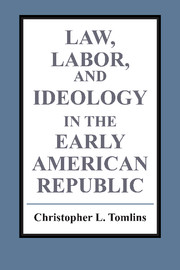Book contents
- Frontmatter
- Contents
- Preface and acknowledgments
- Prologue: two moments of the republic
- PART 1 LAW AND THE FACTS OF AMERICAN LIFE
- PART 2 LAW, LABOR, AND STATE
- PART 3 LAW, AUTHORITY, AND THE EMPLOYMENT RELATIONSHIP
- Introduction: the nomenclature of power
- 7 The law of master and servant
- 8 Master and servant in republican America
- An interlude: on law and economy
- PART 4 THE NEW INDUSTRIAL ORDER
- Epilogue: “free Ameriky”
- Index
7 - The law of master and servant
Published online by Cambridge University Press: 05 August 2012
- Frontmatter
- Contents
- Preface and acknowledgments
- Prologue: two moments of the republic
- PART 1 LAW AND THE FACTS OF AMERICAN LIFE
- PART 2 LAW, LABOR, AND STATE
- PART 3 LAW, AUTHORITY, AND THE EMPLOYMENT RELATIONSHIP
- Introduction: the nomenclature of power
- 7 The law of master and servant
- 8 Master and servant in republican America
- An interlude: on law and economy
- PART 4 THE NEW INDUSTRIAL ORDER
- Epilogue: “free Ameriky”
- Index
Summary
The Clothier told his Story first, and his complaint was as follows; that Edmund Pratt, the Person brought before him, was a Journeyman Weaver; that he had given him a Piece of Work to do, which he promis'd to finish for him out of hand, and that now he had neglected it … that at last, when he entreated him to go to work, he answer'd him flat and plain, he would not work; that he did not want Money, and would not work, not he; and for this Reason he came to his Worship for a Warrant to bring Edmund before him.
The Justice answer'd him very sencibly; first, that as he (Edmund) was not an Apprentice, or a hir'd Covenant-Servant, bargain'd with for the year, that is, for a certain time and the like; the Case did not lie before him; and that if the Fellow was a Knave, and would not perform his Agreement, he must sue him for his Bargain.…
This I mention, because I think, if the Laws of England are deficient in any thing, it is in this, namely, that they do not empower the Justices to compel labouring People who undertake work, to finish it.… [l]f this was the Case, much of the Mischief would be remedied that way.
But this Deficiency of the Law, it seems the Fellow knew, and this made him not only saucy and peremptory to his Employer, but very pert and impudent before the Justice himself, as you will see.
Daniel Defoe, The Great Law of Subordination consider'd; or, the Insolence and Unsufferable Behavior of servants in England duly enquir'd into- Type
- Chapter
- Information
- Law, Labor, and Ideology in the Early American Republic , pp. 232 - 258Publisher: Cambridge University PressPrint publication year: 1993
- 1
- Cited by



